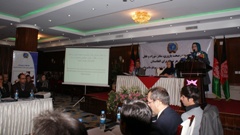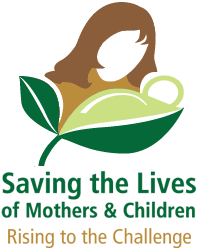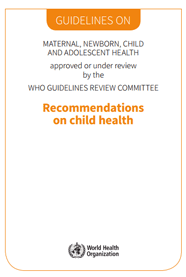Afghanistan launches maternal and child health acceleration plan
 The Minister of Public Health, Dr Suraya Dalil, and United Nations partners launch the national maternal and child health acceleration plan in Kabul to further reduce maternal and child deaths in the country17 December 2013 | His Excellency the Minister of Public Health, Dr Suraya Dalil, and United Nations partners on 8 December 2013 launched in Kabul the national maternal and child health acceleration plan 2013–2015 and the Every Newborn Action Plan to further reduce maternal, neonatal and child deaths in the country.
The Minister of Public Health, Dr Suraya Dalil, and United Nations partners launch the national maternal and child health acceleration plan in Kabul to further reduce maternal and child deaths in the country17 December 2013 | His Excellency the Minister of Public Health, Dr Suraya Dalil, and United Nations partners on 8 December 2013 launched in Kabul the national maternal and child health acceleration plan 2013–2015 and the Every Newborn Action Plan to further reduce maternal, neonatal and child deaths in the country.
The event was attended also by Ms Karin Hulshof, UNICEF Regional Director for South Asia, Dr Rik Peeperkorn, WHO representative for Afghanistan, Dr Annette Sachs Robertson, UNFPA representative, development partners including USAID (US Agency for International Development), The World Bank, EU (European Union), JICA (Japan International Cooperation Agency), Italian Cooperation, Aga Khan Foundation Network, Save the Children, MSH (Management Sciences for Health), ACTED (Agency for Technical Cooperation and Development), Deputy Ministers, directors of the central government and provincial health departments, professional associations, media and civil society.
There has been substantial progress in Afghanistan in reducing child and maternal mortality in recent years. Despite the efforts made, child and maternal mortality remain high, among the highest in the Region. The national maternal and child health acceleration plan aims to contribute to reducing child and maternal mortality rates to the targets set for 2015 in the Afghanistan Health and Nutrition Policy 2012–2020.
The costed, acceleration plan, developed by the Reproductive and Child Health Departments of the Ministry of Public Health and its partners, aims to achieve up to 10% increase in access to life-saving, essential reproductive, maternal, newborn and child health services by people living in the country’s most underserved and underprivileged areas, accelerating implementation of a package of cost-effective interventions. It targets the population in 7 provinces, about 3.4 million people.
The focus of the plan is to enhance the capacity of the provinces to plan, implement, follow up and evaluate, relying also on their own technical resources. The plan supports the implementation of the basic package of health services and essential package of hospital services, to improve the delivery of maternal and child health services, also at community level. It includes capacity-building for different categories of health providers, both at facility and community levels, and also comprehensive community mobilization and communication activities.
The national Maternal and Child Health acceleration plan has been developed in line with the commitment to the UN Secretary-General’s Global strategy for women’s and children’s health and the Dubai Declaration. The Declaration ensued from the regional initiative on Saving the lives of mothers and children launched by WHO, UNICEF and UNFPA in close partnership with countries and stakeholders at a high-level meeting in Dubai in January 2013. The initiative aims at accelerating the rate of progress towards the Millennium Development Goals 4 and 5 on reduction of child and maternal mortality, respectively.Afghanistan is the third country in the Region to formally launch the maternal and child health acceleration plan.
Related links
Morocco launches maternal and child health acceleration plan
 3 December 2013 | The National acceleration plan for maternal and child health 2013–2015 was launched in Rabat on 13 November 2013, at a ceremony chaired by His Excellency Dr El Houssaine Louardi, Minister of Health, and in the presence of Dr Ala Alwan, WHO Regional Director for the Eastern Mediterranean, key partners including UNFPA, UNICEF and the Spanish Cooperation, directors of the central government, regional directors, representatives of professional societies and civil society.
3 December 2013 | The National acceleration plan for maternal and child health 2013–2015 was launched in Rabat on 13 November 2013, at a ceremony chaired by His Excellency Dr El Houssaine Louardi, Minister of Health, and in the presence of Dr Ala Alwan, WHO Regional Director for the Eastern Mediterranean, key partners including UNFPA, UNICEF and the Spanish Cooperation, directors of the central government, regional directors, representatives of professional societies and civil society.
There has been a substantial progress in reducing child and maternal deaths in Morocco over the years. The under-five mortality rate fell by 61% between 1990 and 2012, while the maternal mortality ratio fell by 67% between 1990 and 2010.
The national plan was developed as part of the regional initiative on Saving the lives of mothers and children launched by WHO, UNICEF and UNFPA in close partnership with countries and stakeholders at a high-level meeting in Dubai in January 2013 and as a commitment to the Dubai Declaration. The initiative aims at accelerating the rate of progress towards the Millennium Development Goals 4 and 5 on reduction of child and maternal mortality, respectively.
The Moroccan plan aims to bring about further reduction in under-five and maternal mortality to reach by 2015 a reduction of 70% and 82%, respectively, from the 1990 levels.
The plan targets 65% of the Moroccan population living in 44 provinces in 9 regions, to reach the most underserved. The focus is to enhance the capacity of the regions to plan, implement, follow up and evaluate, relying on their technical resources, and to increase access to high quality MCH services, targeting both primary health care and referral care.
Morocco is the second country in the Region to formally launch the maternal and child acceleration plan. All the priority countries in the Region covered by the initiative have developed their acceleration plans.
Related links
Grading of recommendations on child and newborn health, WHO guidelines
 6 November 2013 – WHO has published reviews of recommendations included in the guidelines on child and newborn health.
6 November 2013 – WHO has published reviews of recommendations included in the guidelines on child and newborn health.
The documents provide information on the strength of each recommendation and quality of evidence on which the recommendation is based, following the GRADE (Grading of the Recommendation Assessment, Development and Evaluation) system.
The guidelines have been approved or are in the final stages of approval by the WHO Guidelines Review Committee.
The recommendations concern the health interventions that children should receive.
Related link
Compilation of WHO recommendations on child and newborn health








